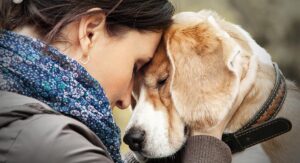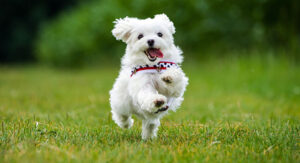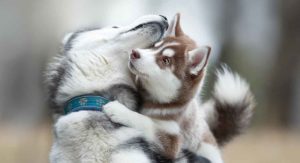The dolichocephalic or long face dog has an elongated skull and jaw bones, which give them their characteristic long heads. Dolichocephalic dog head shapes are closer to the natural shape of their ancestor, the wolf. This protects them from the myriad of health problems caused by brachycephaly. Despite this, long […] Read More
Labrador Size Guide: What to Expect From Your Full Grown Lab
Adult Labrador size ranges from 55 to 85lbs in weight. Your Labrador Retriever will reach anywhere from 21 to 25 inches tall when fully grown. How big your pup gets will depend upon whether they are male or female, and if they come from American or English breeding lines. Labrador […] Read More
Pet Loss Quotes To Help You Through The Toughest Of Times
Pet loss quotes can help your broken heart begin to heal, or help you to sympathize with a grieving family member or friend. They can be powerfully emotive when you are mourning the painful loss of a pet. Pet loss quotes can reassure you about a tough decision or be […] Read More
Big Dogs
There is something special about really big dogs. Something that makes us feel warm and safe. From the story of Peter Pan to the tragic tale of Gelert, literature and folklore brims with legends of giant dogs that loyally protect their human friends. Big dogs are often tall and leggy, […] Read More
Cartoon Dog Names – Character Names From TV Shows to Animated Movies
Cartoon dog names go way beyond the Scoobys, Snoopys, Pongos and Perditas of the world. Cartoon dog characters have been launched at our screens and into our homes from animated movies to breakfast tv, as brand mascots, and in comic strips and books for more than a hundred years. Today […] Read More
Dog Pregnancy Calendar – What To Expect When She’s Expecting
The dog pregnancy calendar is 63 days or 9 weeks long on average. It starts at the point of ovulation, and ends with the puppies’ birth. By counting from the point of ovulation, the stages and milestones of a dog’s pregnancy can be predicted with uncanny accuracy. Today we take […] Read More
Are German Shepherds Good With Other Dogs?
German Shepherds are not always good with other dogs. In fact, many studies into canine aggression have stated that German Shepherds score higher than average for hostility towards other dogs. However, dogs that grow up together are more likely to get along than those that are introduced at a later […] Read More
What Is Considered A Small Dog?
There isn’t a definitive threshold for what is considered a small dog. Lots of pet food manufacturers, vets and groomers subscribe to an informal definition that small dogs weigh around 20 lbs or less. But whenever describing a dog’s size has real world consequences it is important to be accurate […] Read More
Why Do Dogs Lick The Air?
Persistent and excessive air licking in dogs can be caused by anxiety or stress, and some dogs end up doing it quite compulsively. However it can also be a result of illness. Nausea, dental problems and even seizures can result in this unusual behavior. If you can’t think of anything […] Read More
What Is The Scruff Of A Dog?
What is the scruff of a dog? A dog’s scruff is an area of loose skin on the back of their neck. It covers the area from roughly the base of their skull, to the center point between their shoulder blades. And it’s about as wide as the distance between […] Read More
Why Do Dogs Suckle In Their Sleep?
Why do dogs suckle in their sleep? Suckling or nursing is a natural behavior between puppies and their mothers, but it can worry owners when they see their older dogs suckling in their sleep. Some dogs will noisily suckle on thin air, others will chew or suckle on a blanket, […] Read More
Morkie Temperament
The Morkie is a designer dog, with a Maltese and a Yorkshire Terrier for parents. The typical Morkie temperament isn’t too hard to predict. Your Morkie is likely to be friendly, affectionate. Morkies fit well into smaller homes where someone is around for much of the day. As a pet […] Read More
Are Pugs Aggressive?
Pugs are not regarded as an aggressive dog breed. Throughout history, their only purpose has been to serve as companions and lapdogs. Aggressive individuals would be unsuited to this. And only the most placid individuals would be used for breeding new generations. However, all dogs can learn to react aggressively […] Read More
25 Fascinating Chihuahua Facts – How Many Did You Know?
How many Chihuahua facts do you know? I bet some of my favorites will surprise you! It’s easy to fall in love with these dainty dogs, but they aren’t just a pretty face. This breed has an amazing history, and although small the world is packed with fascinating Chihuahua facts! […] Read More
Husky Names – Great Name Ideas For Siberian and Alaskan Huskies
Husky names can be inspired by their working sled dog origins or fascinating characteristics. Like that deep, patterned fur coat, soulful expression or fluffy tail! These wolf-like dogs suit names that are tough, bold, clever and athletic. Or celebrate their amazing ability to deal with the cold. Today I’ll share […] Read More
Runt Of The Litter – What to Expect and How to Care for Runt Puppies
The runt of the litter doesn’t just mean the smallest puppy in the pack. The littlest puppy in most litters is just as healthy as its siblings, and meets the average measures for height and weight for a newborn dog. The runt of a litter is a puppy that is […] Read More
Which Breed Of Dog Sheds The Least?
There are lots of pragmatic reasons for wanting to know which breed of dog sheds the least. For me, once I’d narrowed down a shortlist of healthy hounds with the right kind of temperament and exercise needs, I don’t mind admitting that how much extra vacuuming their coat would create […] Read More
Why Is My Dog Obsessed With Me?
My dog is my first companion of the canine kind, and owning him has been a learning curve in lots of ways. Like any anxious new parent, I can’t help fretting about whether his behavior is normal or not. Something I do know is: he LOVES my attention, and sometimes […] Read More
Merle Dog Information Center – The Beauty and the Dangers
Merle dog coats have irregular patches of blue or red hair, that are laid over a lighter, or diluted, shade of the same pigment. The merle gene can change coat color, skin tone and even eye color in dogs. If you have two merle genes or a double merle it […] Read More
Easiest Dogs To Train
The easiest dogs to train are those that come from intelligent, cooperative and focussed breeds. And it helps if they are food motivated too!The cleverest dogs are those which were bred to work with their handlers, doing complicated tasks. And often at a distance, where they need to respond to hand […] Read More


















